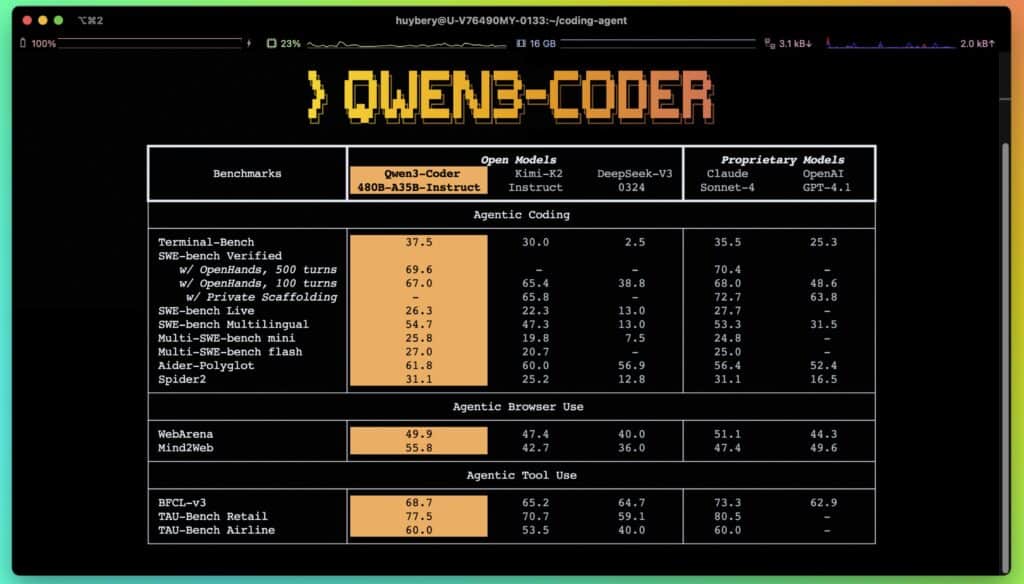With 480 billion parameters, support for 256K tokens, and compatibility with over 300 programming languages, Alibaba Cloud’s new AI challenges Claude Sonnet and GPT-4 in intelligent software development.
Alibaba Cloud has officially launched Qwen3-Coder, its most advanced model to date for coding tasks and automating digital tools. This ambitious step marks a new generation of autonomous AI agents capable not just of generating code but of planning, interacting with environments, using external tools, and solving complex problems in multiple steps.
Developed by Alibaba’s Qwen team, this model features a Mixture of Experts architecture with unprecedented power: 480 billion parameters, with 35 billion active per query. Its 256K token context window, expandable to 1 million with techniques like YaRN, allows it to understand and work with entire repositories, extensive documentation, and large-scale software structures.
More than just a code generator: an intelligent agent
Unlike other models focused solely on competitive code generation, Qwen3-Coder adopts a broader vision of “agentic coding,” involving not only writing functions but understanding workflows, using tools like browsers, terminals, or IDEs, receiving feedback, and adapting to reach a final goal.
During its post-initial training, Alibaba’s team scaled reinforcement learning techniques across 20,000 parallel virtual environments, enabling Qwen3-Coder to perform realistic tasks such as bug patches, project planning, and refactoring complex code with high success rates, especially in tests like SWE-Bench Verified.
| Model | Parameters | Context Tokens | Language Support | Agentic Capabilities | Open Source |
|---|---|---|---|---|---|
| Qwen3-Coder-480B-A35B | 480B (35B active) | 256K (1M with YaRN) | +300 | ✔️ Advanced | ✔️ Yes |
| Claude Sonnet 4 (Anthropic) | Not disclosed | +200K | +100 | ✔️ High | ❌ No |
| GPT-4 (OpenAI) | ~1T (estimated) | 128K (API) | +100 | ✔️ Partial | ❌ No |
| Deepseek-Coder V2 | 236B | 128K | +86 | ❌ Limited | ✔️ Yes |
| Code LLaMA 70B (Meta) | 70B | Approx. 100K | +50 | ❌ Basic | ✔️ Yes |
| StarCoder2 | 15B | 100K | +80 | ❌ No | ✔️ Yes |
Note: The parameter information for GPT-4 and Claude Sonnet is based on unofficial estimates.
Supported programming languages
Qwen3-Coder is among the most versatile models for programming languages. Here are some highlights from over 300 supported languages:
- Main languages: Python, JavaScript, Java, C, C++, C#, Go, Rust, PHP, HTML, CSS, TypeScript
- Scientific languages: R, MATLAB, Julia, Fortran
- System languages: Bash, PowerShell, Assembly, Verilog, VHDL
- Functional languages: Haskell, Lisp, OCaml, Elixir
- AI languages: Prolog, TensorFlow Graph, PyTorch Script
- Niche and experimental languages: Brainfuck, LOLCODE, Zig, Ada
Tools for use and deployment
The model includes Qwen Code, an open-source CLI tool based on Gemini CLI that enables easy interaction with Qwen3-Coder. It also supports Claude Code and environments like Cline (a custom LLM router). Additionally, it can be integrated directly via API from Alibaba Cloud Model Studio, with functional examples in Python and other technologies.
Is autonomous programming the future?
According to its developers, the goal is clear: allow AI agents to take a more active role in the software development of the future—handling tedious tasks and freeing human engineers to focus on creativity, design, and strategic decisions. They are already working on self-improvement capabilities, exploring a future where models can debug, update, and evolve with minimal supervision.
With Qwen3-Coder, Alibaba positions itself as a key player in the push for generative AI and is redefining how machine-assisted programming is understood. In a world where code writing becomes increasingly a collaborative effort between humans and intelligent agents, this Chinese model has taken a significant step toward becoming a leading force.
Source: Qwen3 Coder

